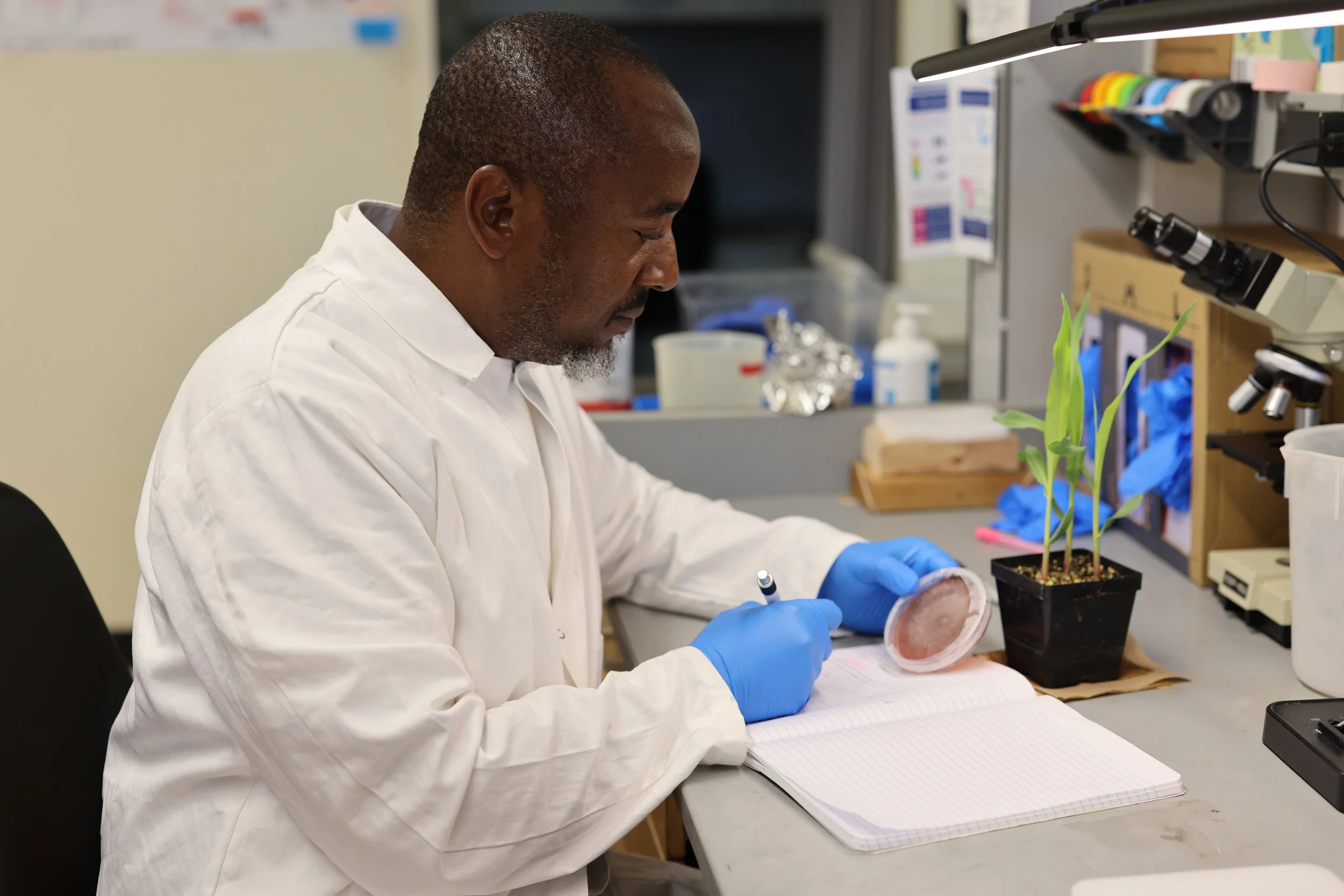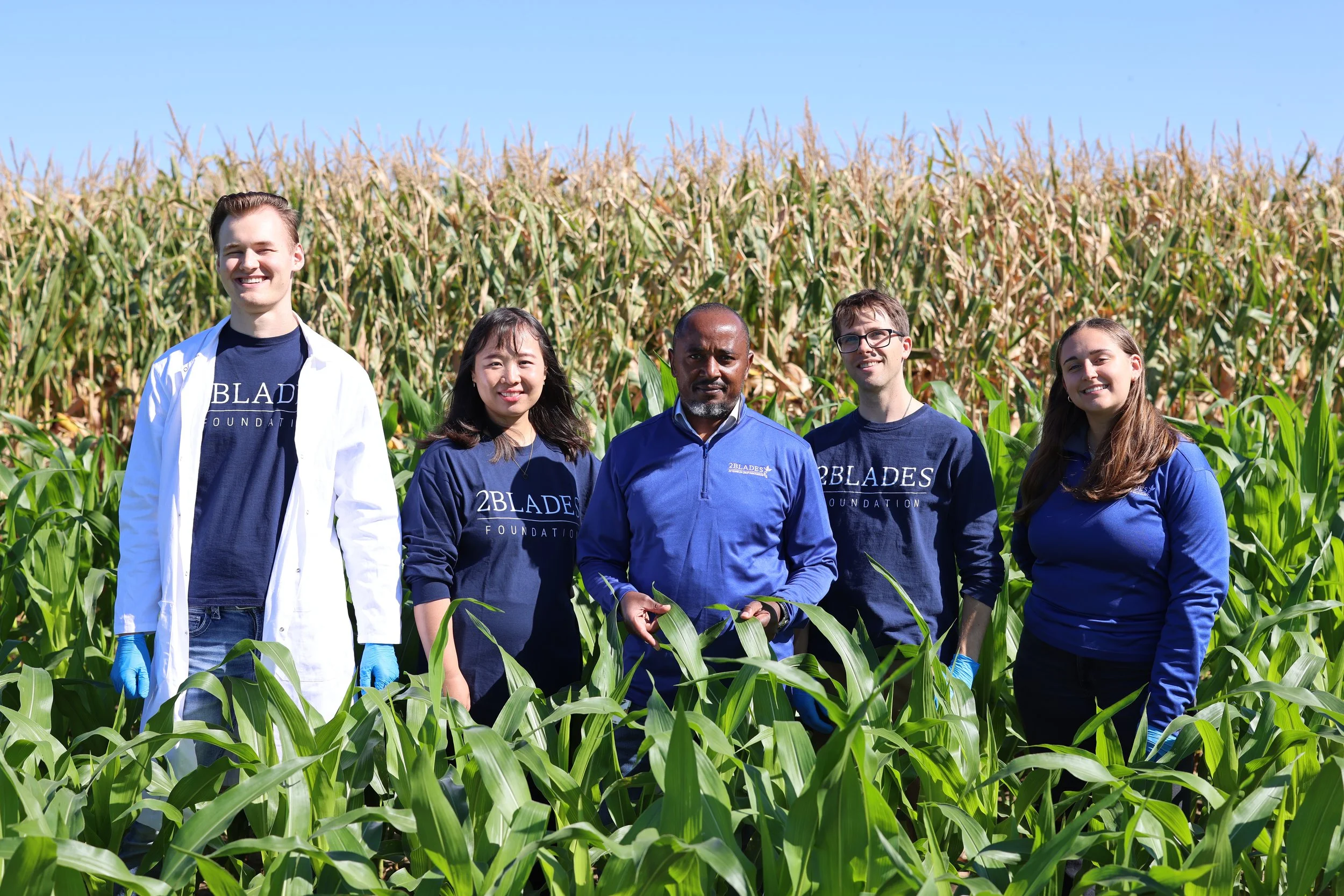2Blades Secures $1 Million Grant to Advance Mycotoxin Work
The Foundation for Food & Agriculture Research (FFAR) has announced that 2Blades will receive $1,000,000 in funding through its Seeding Solutions program, an annual grant competition that supports bold research in one of their Research Priority Areas. 2Blades’ proposal aims to leverage its proprietary gene discovery platform to develop corn varieties resistant to toxigenic fungi. In addition to FFAR’s support, 2Blades and Mars provided matching funds with Bayer contributing in-kind support for a total investment of $2,727,930.
The full announcement can be found below.
Source: https://foundationfar.org/news/public-private-collaboration-helps-develop-corn-resistant-to-fungal-disease/
***
2Blades Group Leader, Dr. Josiah Mutuku, observing the growth of an isolate of Fusarium graminearum.
EVANSTON, Ill. (December 12, 2024) – Corn is one of the most consumed crops globally, and demand is expected to significantly increase by 2050 as a result of population growth and changing dietary habits. However, crop diseases are a major threat to yield. A danger associated with corn consumption is mycotoxins - chemicals produced by certain fungi that grow within the corn plant that cause illness and death in humans and animals. In the United States, mitigation efforts and crop losses due to mycotoxins cost growers $1.4 billion annually. The Foundation for Food & Agriculture Research(FFAR) is awarding a $1,000,000 Seeding Solutions grant to 2Blades to use new genetic tools to develop corn that is resistant to these fungi. 2Blades and Mars provided matching funds with Bayer contributing in-kind support for a total investment of $2,727,930.
“Mycotoxins not only threaten the livelihoods of growers but also jeopardize food security and pose serious health risks for people and animals,” said Dr. Kathy Munkvold, FFAR scientific program director. “This research aims to develop cost-effective, durable resistance to the fungi that produce mycotoxins and package it where it is needed most, in corn seeds.”
Genetic resistance to mycotoxin-producing fungi is the most cost-effective means of reducing these impacts, but there are currently no varieties of corn with this resistance. 2Blades researchers, led by Dr. Josiah Mutuku, are bringing new insights and cutting-edge tools to advance strong, long-lasting resistance to these fungi.
The 2Blades Group in St. Paul. From L to R: John Lutterman, Dr Mengying Wang, Dr. Josiah Mutuku, Dr. Brian Rutter and Madelyn Jacobs.
The researchers are using new gene discovery platforms to analyze thousands of plant cell surface receptor proteins. These proteins can bind molecules that may reveal the presence of the fungus to the plant. Upon detection of the invader, the plant can mount an immune response that prevents fungal growth and mycotoxin production. The genes for these proteins will then be transferred to corn to generate resistant crops.
This scientific research is enabling food systems and supply chains to be more resilient. By developing corn varieties resistant to toxic fungi production costs will be lower, and both grain quality and yield will be preserved, which helps to increase the income of growers. This is a significant step to continue to ensure there is safe food for all.
“Increasing crop resilience against toxigenic fungi has been a persistent challenge,” said Dr. Mutuku. “With the support of the Seeding Solutions grant, we look forward to bringing fresh insights to address this longstanding issue. This initiative will benefit a wide range of stakeholders that are directly and indirectly affected by contaminated corn-based food and feeds, and we are delighted to have FFAR, Mars and Bayer as partners in this project.”
To learn more about this grant, visit the Developing Durable Corn Resistance to Fungal Threats in Corn page on FFAR’s website.



